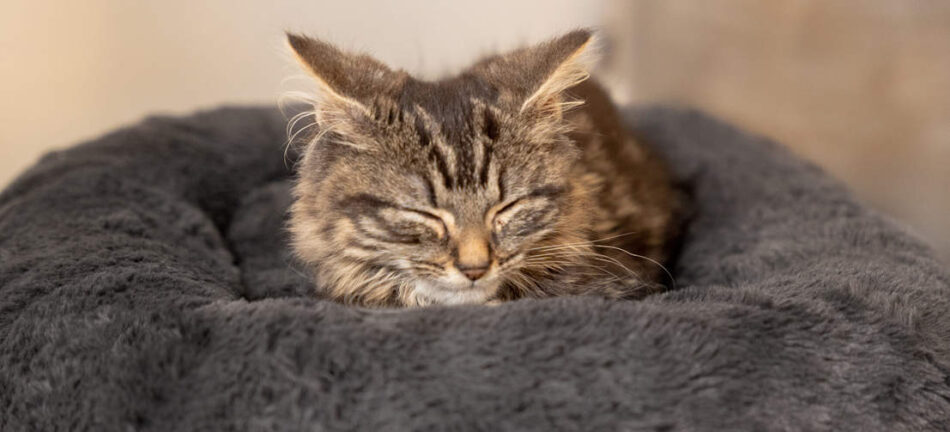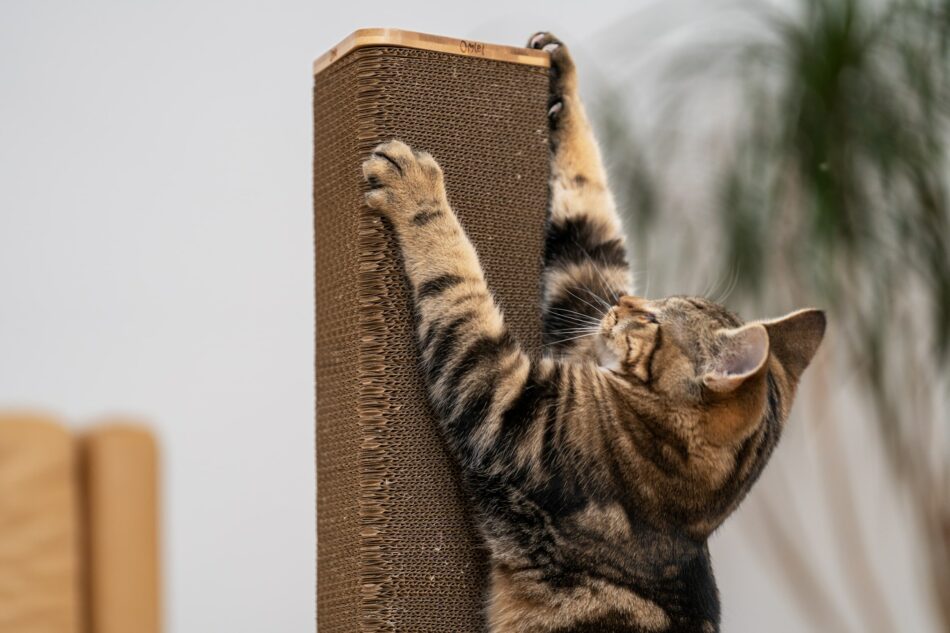Cats and stress
You’ve had a hectic week at work and now the car’s broken down. Sound stressful? It’s only human to let things get the better of us sometimes, and in times of trouble, we often turn to our four-legged companions to calm us down. Cats always manage to find a way to help us relax and give us something else to focus on for a moment. But do you ever think about what might potentially make them stressed? Stress is not an uncommon problem with cats. They can be anxious animals that don’t deal well with change, so there are lots of factors that might make your pet stressed. It’s not always easy to spot signs of stress, or to combat them, but it’s important to try, as chronic stress can lead to health and behavioral problems in felines.
4 common causes of stress in cats
Physical factors
An illness or physical trauma that requires treatment or medication will very likely make your cat feel worried. Apart from the potential pain or discomfort, the cat might also have to take pills or wear a cone, which limits their agility and freedom. Being in heat, or your cat being pregnant, will unsurprisingly make most female cats feel on edge, and it is very difficult to tell them what’s happening to their bodies. Apart from more medical conditions, grooming-related changes like having a bath or getting a haircut can sometimes cause stress in your cat.
Environmental factors
The big ones here are moving to a new house, or spending time away from the home, like in a kennel or on holiday. Cats prefer the safety of what they know, and will most likely not enjoy traveling anywhere.
Extreme weather and seasonal changes can make cats worried and stressed, as can a lack of stimulation in their current living space. Outdoor cats who for some reason have been limited to the house will for example often develop stress-related symptoms. Another common environmental stress factor for cats is the presence of other pets, including another cat. If you’re considering adding a new feline addition to the family, first, find out how your cats can live in harmony.
Human factors
Anyone unfamiliar to your cat coming into the household can be seen as a threat. Whether they’re guests who are just over for dinner or new housemates moving into the spare bedroom, this can make your pet anxious. A new baby in the house can be stressful for everyone involved – two and four-legged family members alike. This isn’t to say that cats and children cannot get along great, but what’s important is that boundaries are respected. The Maya Indoor cat house from Omlet is the ideal spot for a kitty escape, which can be placed out of reach from any disturbances. The super soft Omlet Maya Donut cat bed slots in perfectly to the cat house, too, making their hideaway the ultimate spot for catching up on cat naps.
Litter tray and diet factors
Changing your cat’s brand or type of litter or food can also make your cat stressed. If you plan on switching your cat’s litter, this should be done over a gradual period of time, mixing the new litter, with the old. A new litter box can also be anxiety-inducing, as can an unusually dirty tray or lack of food and water.
What can stress do to a cat?
Bursts of stress, fear or anxiety are normal and harmless, but it’s prolonged, chronic stress that can be dangerous. Like in humans, longer periods of stress are associated with depression and a weakened immune system. In cats, stress is also believed to cause or trigger conditions like feline asthma. Stress can also cause many behavioral problems such as aggression and litter tray avoidance.
How can I tell if my cat is stressed?
First of all, it’s worth noting that a cat that seems worried by a barking dog outside the window or the sudden noise of something dropping on the floor is completely normal. It’s when your cat is on constant high alert, that you should consider stress management solutions. Here’s what to look out for:
Physical symptoms of stress include, but are not limited to:
- Vomiting and diarrhea
- Excessive shedding and/or grooming
- Changes in eating and sleeping patterns
- Lethargy
Behavioral symptoms of stress include, but are not limited to:
- Significant changes in routines or behavior
- Urinating outside the litter tray and spraying on furniture
- Unexpected aggression towards humans or other pets
- Disinterest in things going on around them
- Excessive meowing
- Hiding for long periods of time
If you notice a change in your cat’s behavior or physical appearance, the first thing you should do is take them to the vet to rule out any possible medical condition that could be causing the symptoms. Stress can in itself be a symptom of some diseases and illnesses, but the vet will be able to give you the best advice for your cat specifically.
What can I do to help my cat?
The most important thing to do is to try and find the source of the stress. Observe your cat’s behavior in different situations to try and see if there are any triggers. Once you think you have located the reason/s your cat feels stressed, it’s time to solve the problem.
Offer a safe space
Firstly, make sure your cat has a safe space they can retreat to when they feel stressed or anxious. It should be a room free from disturbances, where you can place a cat den like the Maya Indoor cat house. It’s important that everyone in the family, children included, knows not to disrupt the cat when they’re in their safe space to make sure they’re able to fully relax.
Social interaction
Spending time with your cat is a good way of providing stimulation for your cat. It also means social interaction for both you and your feline friend, which is great for dealing with stress. It can be chasing after a catnip toy, watching them use their cat scratching post or just relaxing on the sofa – let your cat decide.
Look after yourself
Another thing to consider is that our pets are highly affected by our well-being. If you feel stressed, your cat is more likely to feel stressed, and if you’re relaxed they’re more likely to not see everything around them as a threat. It’s easier said than done to stop feeling a certain way, but perhaps the knowledge that your pet’s mental health could be affected, can inspire you to find new ways of managing your own stress.
Omlet and your cat’s well-being
At Omlet, we expertly design products to put your pets’ well-being first. From the Maya Indoor cat house to Stak cat scratcher, our designers know what both cats and owners need to live a harmonious and stress-free life.
This entry was posted in Cats

